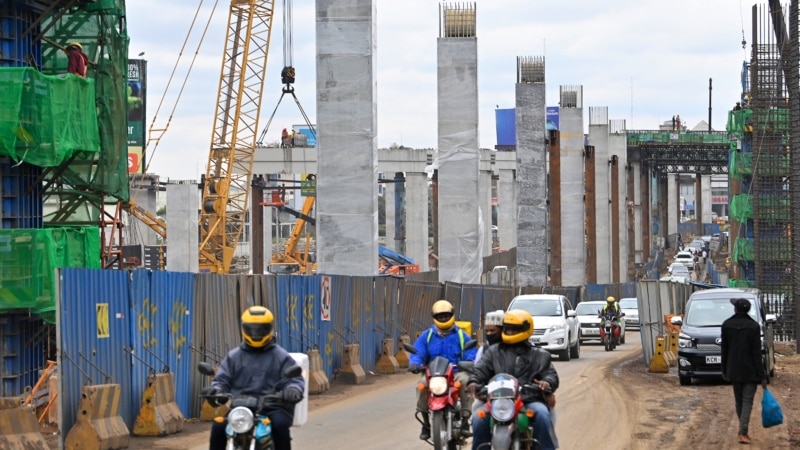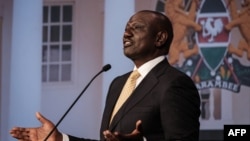This website uses cookies so that we can provide you with the best user experience possible. Cookie information is stored in your browser and performs functions such as recognising you when you return to our website and helping our team to understand which sections of the website you find most interesting and useful.
 johannesburg, south africa —
johannesburg, south africa —
As campaigning gears up for Kenya’s August 9 presidential elections, the two main candidates are both focused on one key talking point - the economy - and this inevitably means the country’s controversial relationship with China is coming under the spotlight.
Deputy President William Ruto, a former chicken-seller who styles himself as a champion of the poor and calls himself the “hustler-in-chief,” has come out with a strongly anti-China platform. He’s vowed to deport Chinese nationals doing jobs he says should be reserved for Kenyans and has also promised to make public government contracts with Beijing.
At an economic forum in June, Ruto said, “Chinese nationals are roasting maize and selling mobile phones. We will deport all of them,” Agence France-Presse reported.
As Africa’s biggest investor, China has been responsible for major infrastructure projects in Kenya, including the recently opened Nairobi Expressway and the controversial and expensive Chinese-built Standard Gauge Railway, which links the capital with the key port city of Mombasa.
But the pro-China policies of current President Uhuru Kenyatta – with whom Ruto has fallen out – now mean Kenya now owes China billions of dollars.
Ruto said he would cut government borrowing and promised to make public opaque contracts with China — something some Kenyan activists have even gone to court over.
In contrast, Ruto’s opposition rival Raila Odinga — who has come up short in four previous presidential bids and is now backed by his former nemesis, Kenyatta — has been less strident on China.
Odinga has noted that Western nations were in Africa before the Chinese, who simply filled a need for infrastructure development, and said working with Beijing does not mean having to exclude other countries. He said recently he would renegotiate terms for the debt.
China spotlight
“The deputy president and the presidential contender William Ruto and his allies have made China a talking point in their campaign, and they’re mostly critical of the role of China in the country,” Cliff Mboya, a Kenyan researcher at the China Global South Project think tank, told VOA.
Another Kenyan independent analyst and China specialist, Adhere Cavince, said he thinks Ruto’s stance is “a politically convenient way to hunt for votes” in the face of rising living costs and high unemployment.
“Kenya is currently experiencing a lot of economic difficulties and there’s been this narrative about the role of China, especially in regard to this debt trap narrative,” Cavince told VOA. “Politicians leverage anything they can blame, and I think for the deputy president, China has become a very easy target.”
Another reason for Ruto’s stance, Cavince said, could be to distance himself from his boss, Kenyatta, with whom he fell out in 2018.
“We understand some of these development projects could have sidelined the deputy president from the lucrative tenders that come with it and so it could be a way of getting back” at Kenyatta, he said.
Mboya likewise said Ruto was trying to distance himself from the government, which has been associated with corruption in relation to Chinese mega-projects.
“It is believed that a lot of money was siphoned off to benefit the political class,” he said.
While many ordinary Kenyans are “very appreciate of the projects,” Mboya added, they are also “angry about the borrowing.”
Both analysts also noted Ruto’s about-turn on Chinese lending and Odinga’s contrasting attitude to the Asian giant.
Previously, Ruto was “protective and defensive” about the government’s relationship with China, but has since changed tack, Cavince said, “maintaining that he will not be going to China to borrow should he ascend to the presidency.”
“Raila Odinga, on the other side ... has equally had a very measured temper to the Chinese,” said Cavince. “He’s been on record in his campaigns, giving the example of China’s development track record, saying it’s possible for Kenya to go the way China did.”
China’s position on lending
While both presidential candidates have expressed concern about Kenya’s debt, Chinese Foreign Minister Wang Yi visited Kenya earlier this year and rejected the “debt trap” accusations.
“All China-Kenya cooperation projects have been scientifically planned and appraised in detail, bringing benefits to the Kenyan people and boosting Kenya's national development and revitalization,” he said.
“Eighty percent of Kenya's foreign debt is owed by multilateral financial institutions, and its debt to China is mainly concessional loans,” he added, according to the official Foreign Ministry statement.
The Chinese Embassy in Nairobi did not respond to VOA’s requests for comment on Ruto’s anti-Chinese rhetoric.
Tough China stance
It is not the first time African leaders have talked tough on China. Former Zambian President Michael Sata reportedly railed against Chinese “profiteers” in the early 2000s and claimed that “Zambia has become a province of China.” In 2018 there was widespread looting of Chinese businesses in Zambia.
Zambia, whose biggest creditor is China, defaulted on its external debt in 2020 and is now negotiating debt restructuring.
But in Kenya’s case, Mboya and Cavince say Ruto’s threats are mainly empty rhetoric, given China’s huge clout on the continent.



 Africana55 Radio
Africana55 Radio 


